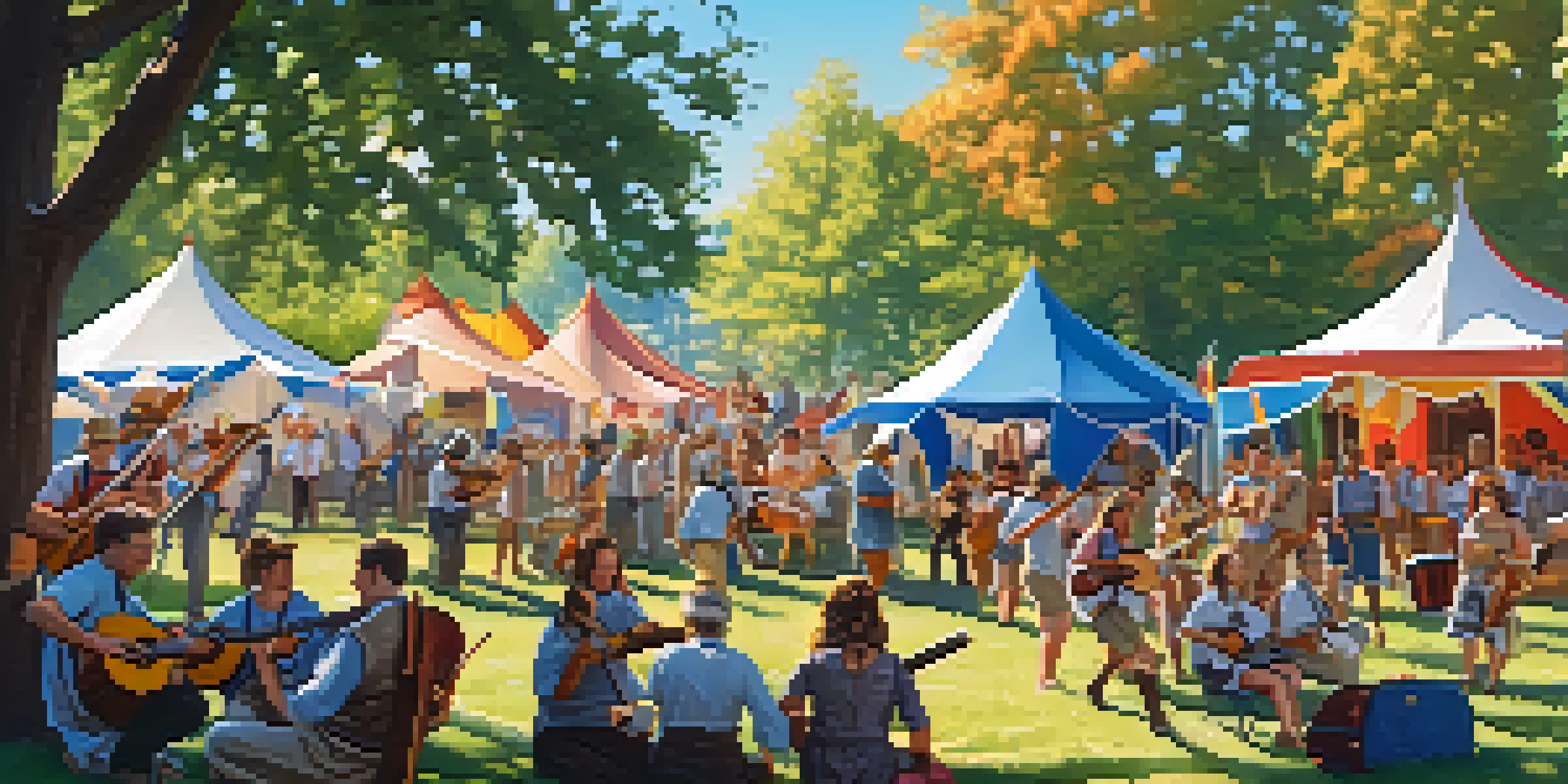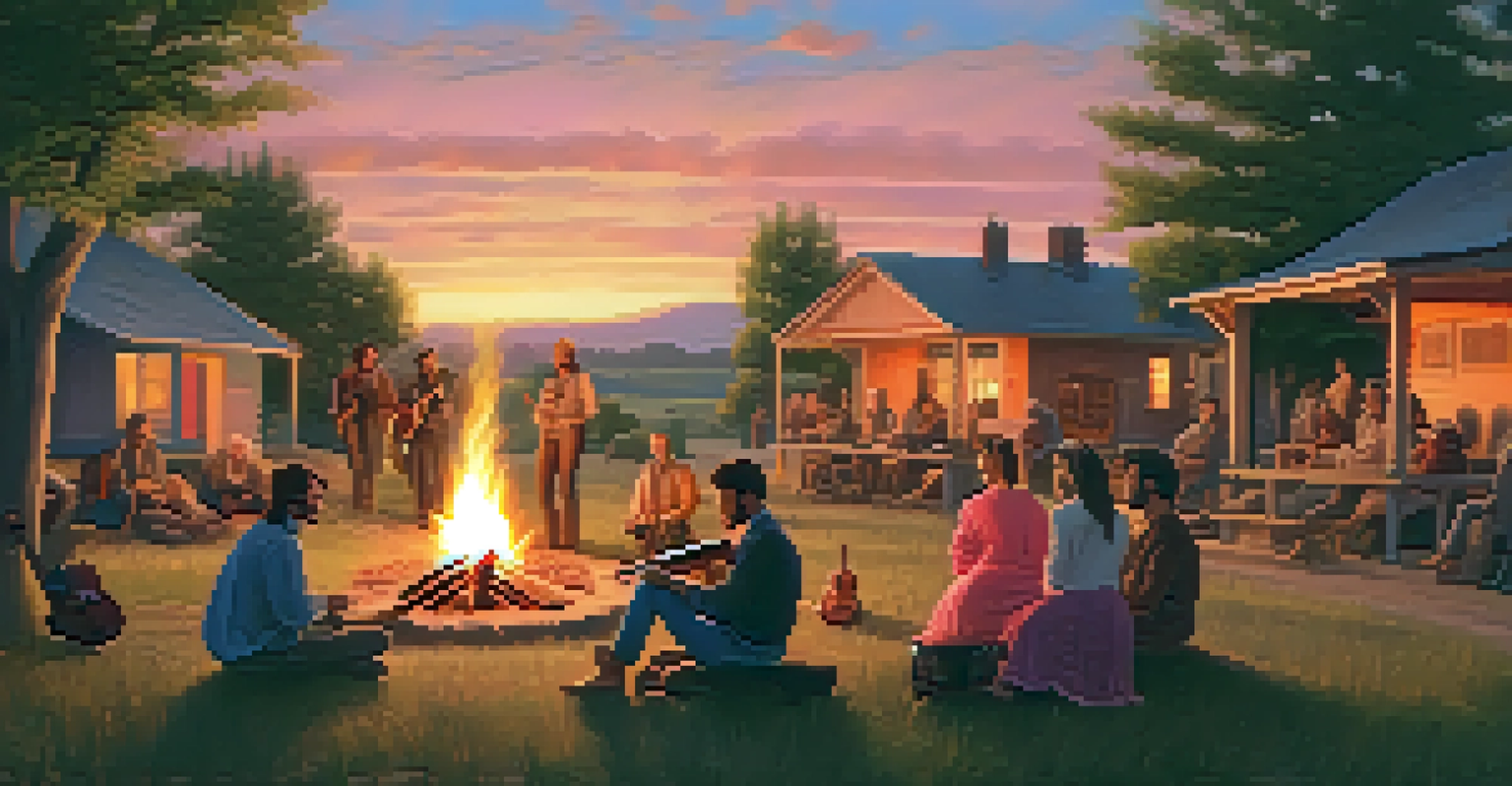Folk Music: A Reflection of Culture and Tradition

Understanding Folk Music and Its Origins
Folk music, at its core, is a reflection of the everyday lives and experiences of ordinary people. It often originates from the oral traditions of communities, passed down through generations. This genre captures the essence of a culture, preserving stories, values, and beliefs in a way that resonates deeply with listeners.
Folk music is the voice of the people, a way for us to express our stories and struggles in a way that resonates across time and geography.
The roots of folk music can be traced back to various cultural practices around the world. From the ballads of the British Isles to the blues of the American South, each style offers a unique glimpse into the society from which it emerged. These songs often address themes of love, hardship, and community, making them timeless and universally relatable.
By engaging with folk music, individuals can connect with their heritage and others' cultures. It's a bridge that promotes understanding and appreciation of diverse backgrounds, reminding us of our shared human experiences despite geographical boundaries.
The Role of Folk Music in Cultural Identity
Folk music plays a crucial role in shaping and expressing cultural identity. It serves as a vehicle for communities to share their history and traditions, reinforcing a sense of belonging. Through lyrics and melodies, folk songs articulate the values and norms that define a group, making them an essential part of cultural preservation.

For instance, Native American folk music often incorporates storytelling that reflects their spiritual beliefs and connection to nature. Similarly, African folk music celebrates community and resilience, often performed during communal events that strengthen social ties. These songs are more than just entertainment; they are a testament to the culture's identity and values.
Folk Music Reflects Cultural Heritage
Folk music captures the essence of communities by preserving their stories, values, and beliefs through generations.
As globalization continues to influence music, folk genres may evolve, but they remain rooted in their cultural significance. This ongoing dialogue between tradition and modernity enriches folk music, allowing it to adapt while still honoring its origins.
Folk Music as a Tool for Social Change
Throughout history, folk music has served as a powerful tool for social change. Artists often use their songs to address pressing social issues, rallying communities around common causes. This unique ability to inspire action and raise awareness is one of the reasons folk music remains relevant today.
Music can change the world because it can change people.
For example, during the civil rights movement in the United States, folk songs like 'We Shall Overcome' became anthems for change. These songs not only united people but also conveyed messages of hope and resilience. Similarly, contemporary folk musicians continue to tackle issues like environmentalism and equality through their music.
By tapping into the emotional and communal aspects of folk music, artists can foster solidarity and motivate listeners to engage in activism. This tradition of using music as a voice for the voiceless highlights the genre's enduring impact on society.
The Evolution of Folk Music Over Time
While folk music is deeply rooted in tradition, it has also evolved significantly over time. Modern folk artists often blend traditional melodies with contemporary styles, creating a fusion that resonates with today’s audiences. This evolution showcases the genre's adaptability and its ability to reflect current cultural contexts.
For instance, artists like Mumford & Sons and The Lumineers have revitalized folk music by incorporating elements from rock and pop, making it accessible to a broader audience. This blending of genres not only keeps the music fresh but also invites new generations to engage with folk traditions.
Folk Music Drives Social Change
Throughout history, folk music has inspired social movements, uniting people around common causes and raising awareness of important issues.
Despite these changes, the core essence of folk music remains intact. It continues to tell stories, convey emotions, and connect people across different backgrounds, proving that even as styles evolve, the fundamental purpose of folk music endures.
Celebrating Folk Music Festivals Worldwide
Folk music festivals play a vital role in celebrating and preserving cultural traditions. These events gather artists and audiences from diverse backgrounds, creating a vibrant atmosphere where music and culture intertwine. Festivals often feature workshops, storytelling sessions, and dance, enhancing the experience for attendees.
One notable example is the Newport Folk Festival in the United States, which has showcased iconic folk musicians since the 1950s. This festival not only highlights traditional folk music but also provides a platform for new artists to share their voices. Such events foster a sense of community and encourage cultural exchange.
Attending folk music festivals offers individuals a chance to immerse themselves in different cultures. Engaging with the music, food, and traditions of various communities enriches our understanding of the world and strengthens our appreciation for the diversity of folk music.
The Instruments of Folk Music: A Cultural Connection
The instruments used in folk music often carry significant cultural meanings and histories. Common instruments like the banjo, fiddle, and accordion are not just tools for making music; they also represent the traditions and stories of the people who play them. Each instrument has its own unique sound that adds depth and richness to the music.
For instance, the lute has deep roots in European folk traditions, while the sitar is central to Indian folk music. The choice of instruments often reflects the cultural context, with each one contributing to the overall storytelling aspect of the music. This connection between instruments and culture emphasizes the importance of preserving traditional craftsmanship.
Folk Music Evolves with Innovation
While rooted in tradition, folk music continues to adapt and thrive by blending with contemporary styles, inviting new audiences to engage with its rich heritage.
Moreover, folk musicians frequently incorporate local materials and techniques when crafting their instruments, further tying the music to the cultural landscape. This relationship between folk music and its instruments showcases the creativity and resourcefulness of communities throughout history.
The Future of Folk Music in a Globalized World
As the world becomes increasingly interconnected, the future of folk music is filled with exciting possibilities. The blending of different cultural influences creates a dynamic landscape where traditional folk music can thrive alongside contemporary genres. This fusion not only enriches the music but also fosters collaboration among artists from various backgrounds.
Digital platforms have played a significant role in this evolution, allowing folk musicians to reach global audiences. This exposure encourages cross-cultural exchanges and collaborations that can lead to innovative sounds and styles. Folk music is no longer confined to its geographical roots; it has become a global conversation.

However, as folk music evolves, it’s essential to respect and honor the traditions from which it originates. By maintaining a balance between innovation and cultural preservation, folk music can continue to enrich lives and foster connections across the globe.